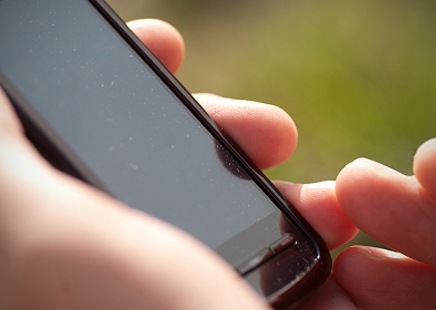There May Be an APP to Help Veterans Fight PTSD A smartphone app being developed by scientists with a Recovery Act grant may be able to help combat veterans suffering from Post Traumatic Stress Disorder. Image courtesy of iStockphoto A combat veteran of the Afghanistan war is experiencing nightmares or crippling anxiety from Post Traumatic Stress Disorder (PSTD). Does the vet wait for an appointment at the area Veterans Administration hospital each time or suffer in silence? Or is there another way to get help immediately? A group of scientists with help from the Recovery Act hope to be able to say one day soon: “There’s an app for that.” The scientists at the University of Massachusetts-Worcester and the Massachusetts Institute of Technology are creating and testing a smartphone app they have named “iHeal” that would respond immediately to physiological changes in a person suffering from PSTD or substance abuse and propose an appropriate intervention. The researchers say that the technology would recognize “stressors that threaten a patient’s recovery and then [deliver] evidence-based interventions exactly at the moment of greatest need.” An “app,” or application, is software that can be downloaded directly to a smartphone. For example, smartphone users can download apps—often for free, sometimes for a small charge—that provide real-time weather reports, news, stock prices, and alerts to subway delays, as well as access to Google, Yahoo! and thousands of other programs. The National Institutes of Health awarded two Recovery Act grants totaling about $1 million to support the scientific research to develop such a mobile application that can help returning combat veterans with PTSD and substance abuse problems. This is how iHeal is supposed to work: The veteran wears sensors on a wrist or ankle band. The sensors pick up changes in pulse rate, perspiration and slight electrical charges in the skin, and continuously report them wirelessly to the iHeal app on the person’s smartphone. A spike in the measurements could mean added psychological stress or it could be the result of exercise. So the researchers are working on a “training data set” and cues for the Artificial Intelligence to identify what is PTSD or drug abuse stress, said one of the principal investigators, Edward Boyer, a physician in the Department of Emergency Medicine at the University of Massachusetts Medical School, Worcester, and at Children’s Hospital in Boston. The computer is able to learn new patterns and characterize the physiological changes, and then anticipate behavior and suggest appropriate interventions, Boyer explained. Sensors and computer programs increasingly are being developed and used for facial recognition and physiological changes that can be interpreted for medical and commercial purposes. In the case of iHeal, the app would “call up” the vet and ask for information about how the user is feeling, what he is craving, where he is going. After the information is inputted, the app provides an intervention specifically appropriate for the individual user. It might be suggested behavior, messages from a loved one, soothing music or images, or the app might contact the user’s counselor. Eventually, the app may also include a GPS component, so when the app becomes “really smart,” it will recognize if the user is headed for a stressful location – perhaps a place where a person had gotten illegal drugs -- and propose an intervention based on that, such as suggesting a different route. For now, however, the researchers are mainly focused on the equipment, not the development of the panoply of interventions that would be needed. And that includes, Boyer added, making sure the app’s contact with the user is discreet and quiet and not aggravating to the point that the user discards the system. The researchers are working with 25 veterans of the Afghanistan and Iraq wars recruited with help of a veterans’ group to test the app and sensors and how the vets interact with the technology, Boyer said. His co-principal investigator is Roslind W. Picard, a professor at MIT and founder of the Affective Computing Research Group. Boyer says he particularly likes the iHeal research project because it is based on reality and real time action. “We’re blending reality into this project as much as possible, by real people in real places with real equipment. We want to infuse reality into the care,” he said. Also, Boyer said: “You rarely have the opportunity to do something this cool and this interesting.” |
|







